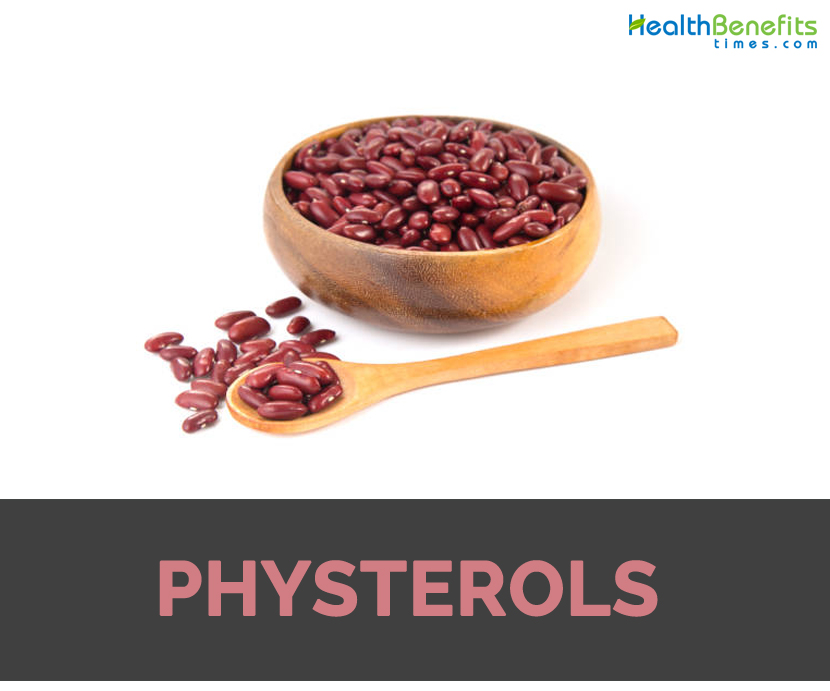 Phytosterols are also known as plant sterols belonging to a family of molecules associated to cholesterol in humans. Most common phytosterols such as β-sitosterol, stigmasterol and campesterol are found in plant seeds, oils and nuts. These are a group of naturally occurring compounds present in plant cell membranes. As a heart healthy eating plan, intake of phytosterols in recommended quantities helps to reduce total cholesterol up to 10 percent and bad cholesterol up to 14 percent. Phytosterols encompassing plant sterols and stanols are phytosteroids similar to cholesterol which occur in plants and vary in carbon side chains or absence of double bond. Stanols are saturated sterols with no double bonds in sterol ring structure.
Phytosterols are also known as plant sterols belonging to a family of molecules associated to cholesterol in humans. Most common phytosterols such as β-sitosterol, stigmasterol and campesterol are found in plant seeds, oils and nuts. These are a group of naturally occurring compounds present in plant cell membranes. As a heart healthy eating plan, intake of phytosterols in recommended quantities helps to reduce total cholesterol up to 10 percent and bad cholesterol up to 14 percent. Phytosterols encompassing plant sterols and stanols are phytosteroids similar to cholesterol which occur in plants and vary in carbon side chains or absence of double bond. Stanols are saturated sterols with no double bonds in sterol ring structure.

Phytosterols naturally occurs in free form and bound forms such as esters of glycosides and fatty acids. Free phytosterols are insoluble in water and soluble in alcohol. In small intestines, pancreatic enzymes usually break down bound forms of phytosterols. They are absorbed by intestines through several mechanisms. These activities compete with intestinal absorption of cholesterol.
Food Sources
| Food name | Weight (g) | Phytosterols (mg) |
| Sesame seeds | 144 | 1028 |
| Soybeans | 186 | 299 |
| Pistachio | 123 | 263 |
| Sunflower seeds | 46 | 246 |
| Kidney beans | 184 | 234 |
| Cashew | 137 | 216 |
| Almonds | 157 | 204 |
| Macadamia nuts | 134 | 155 |
| Adzuki beans | 197 | 150 |
| Pecans | 110 | 119 |
| Grapefruit | 230 | 39 |
| Coconut | 80 | 38 |
| Olive oil | 13.5 | 30 |
| Apricots | 155 | 28 |
| Onions | 160 | 24 |
| Strawberries | 152 | 18 |
| Sweet cherries | 138 | 17 |
| Pears | 140 | 11 |
| Radishes | 116 | 8 |
| Japanese persimmons | 168 | 7 |
Health Benefits
- Prevent cancer
Some evidence shows that phytoesterols reduces the chances of cancer. Study also shows that it reduces chances of breast, lung, stomach and ovarian cancer. Animal study shows anti-cancer properties which slows growth and spread of tumors.
- Lowers cholesterol
Phytosterols lowers cholesterol level. Phytosterols are marketed as pharmaceutical under name Cytellin as a treatment for elevated cholesterol. Phytosterol rich foods promote cholesterol lowering effect of phytosterols. It lowers cholesterol level by competing with cholesterol absorption in gut through one or several possible mechanisms.
Side effects
Phytosterols cause side effects affecting the gastrointestinal tract that includes constipation, nausea, upset stomach, heartburn, fecal discoloration, flatulence and appetite changes.
Recommended Intake
Phytosterols should be consumed daily because when consumption stops, the benefits of cholesterol blocking benefits also stops. Adults with elevated cholesterol are advised to consume between 1500 mg to 2400 mg of plant sterols per day.
References:
https://www.healthline.com/nutrition/phytosterols-good-or-bad#section6
https://my.clevelandclinic.org/health/articles/17368-phytosterols-sterols–stanols
https://www.xtend-life.com/blogs/supplement-ingredients/phytosterol
htps://www.verywellhealth.com/phytosterol-supplement-side-effects-697586
